Hunters of lost professionals
How do industrial companies attract young professionals today? How much has the attitude of applicants really changed? What are the regional differences? What are the opportunities for data-driven recruiting and for which companies is it possible? And how is the UNITED GRINDING Group positioned in this competition for the future? Experts Karin Bauder-Zilly and Gero Hesse talk with Stephan Nell, CEO of UNITED GRINDING Group.
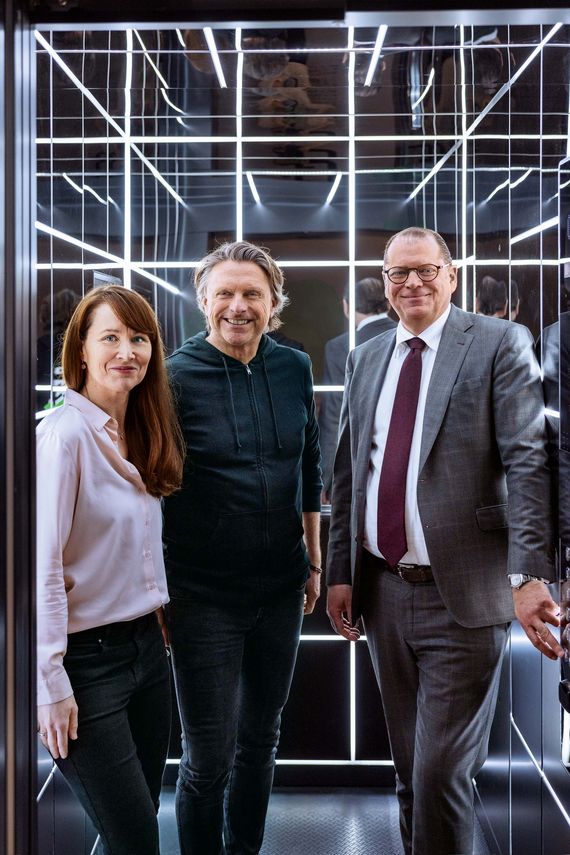
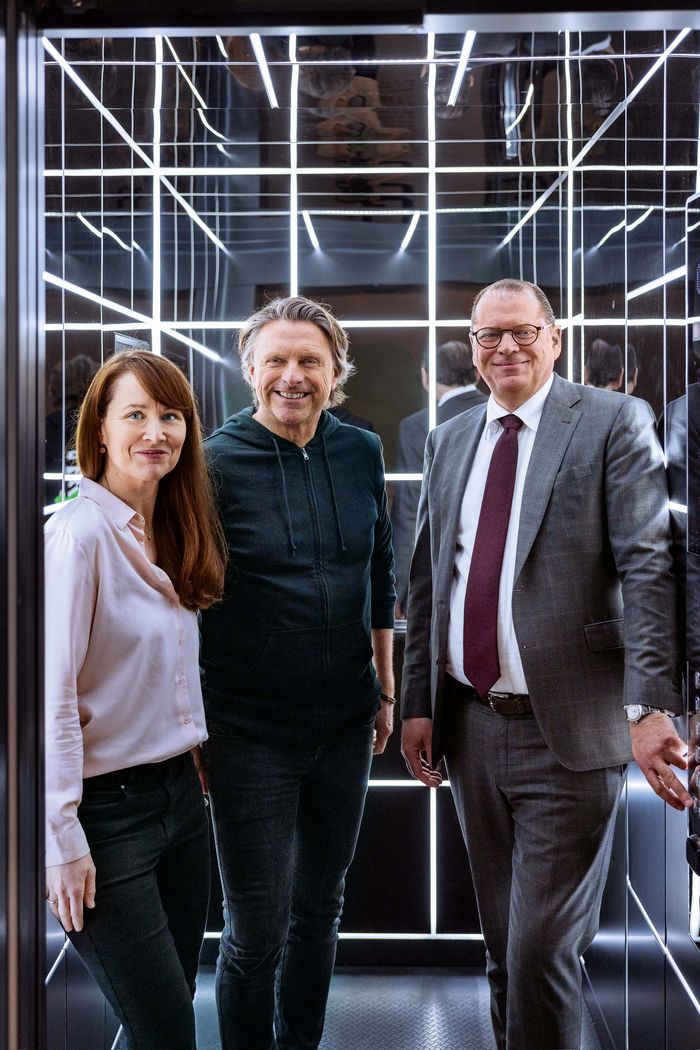
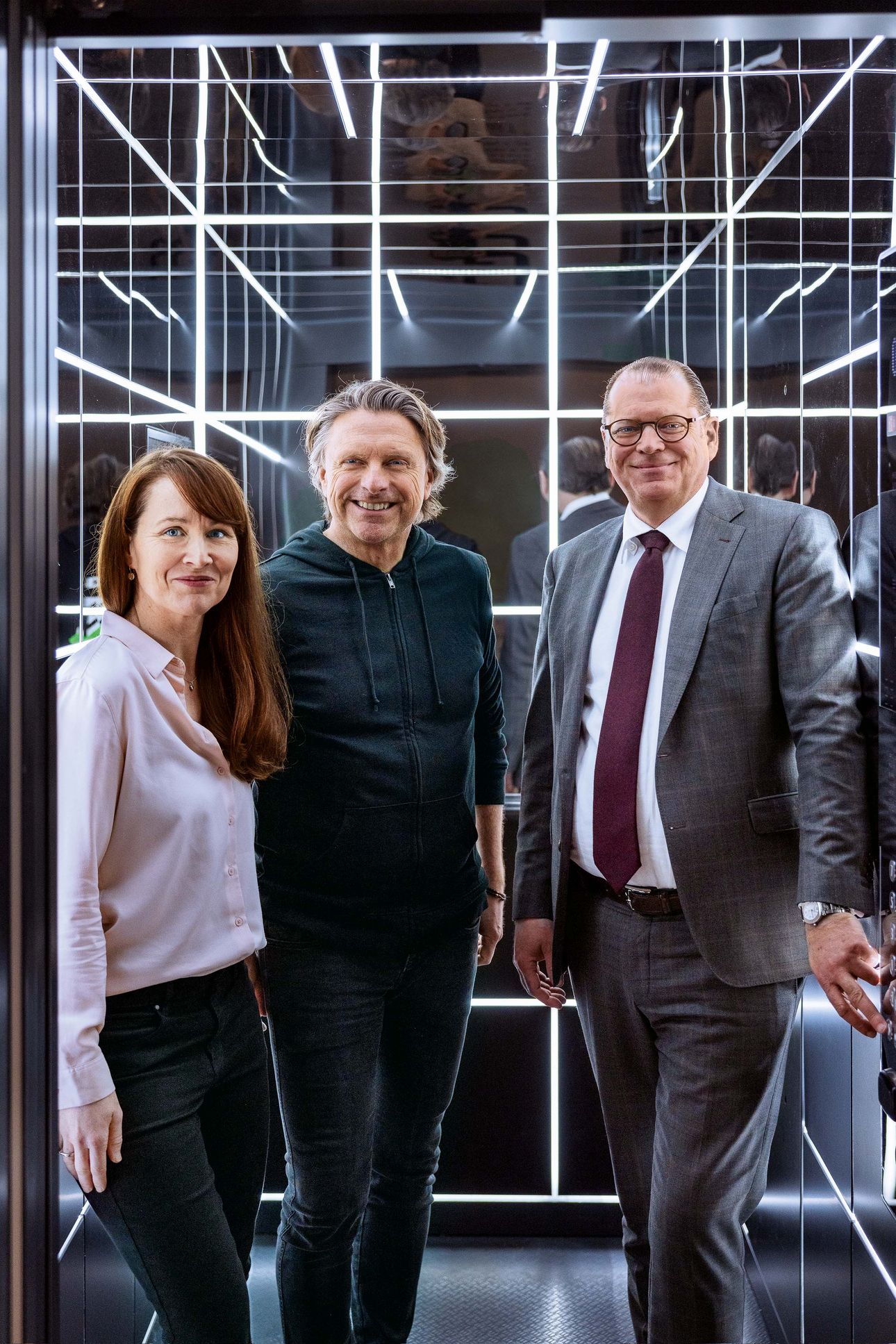
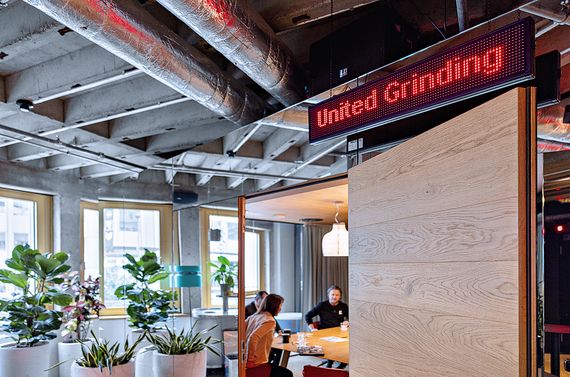
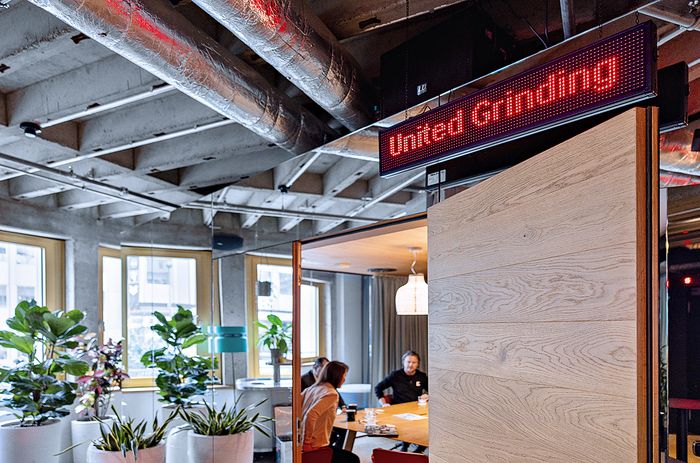
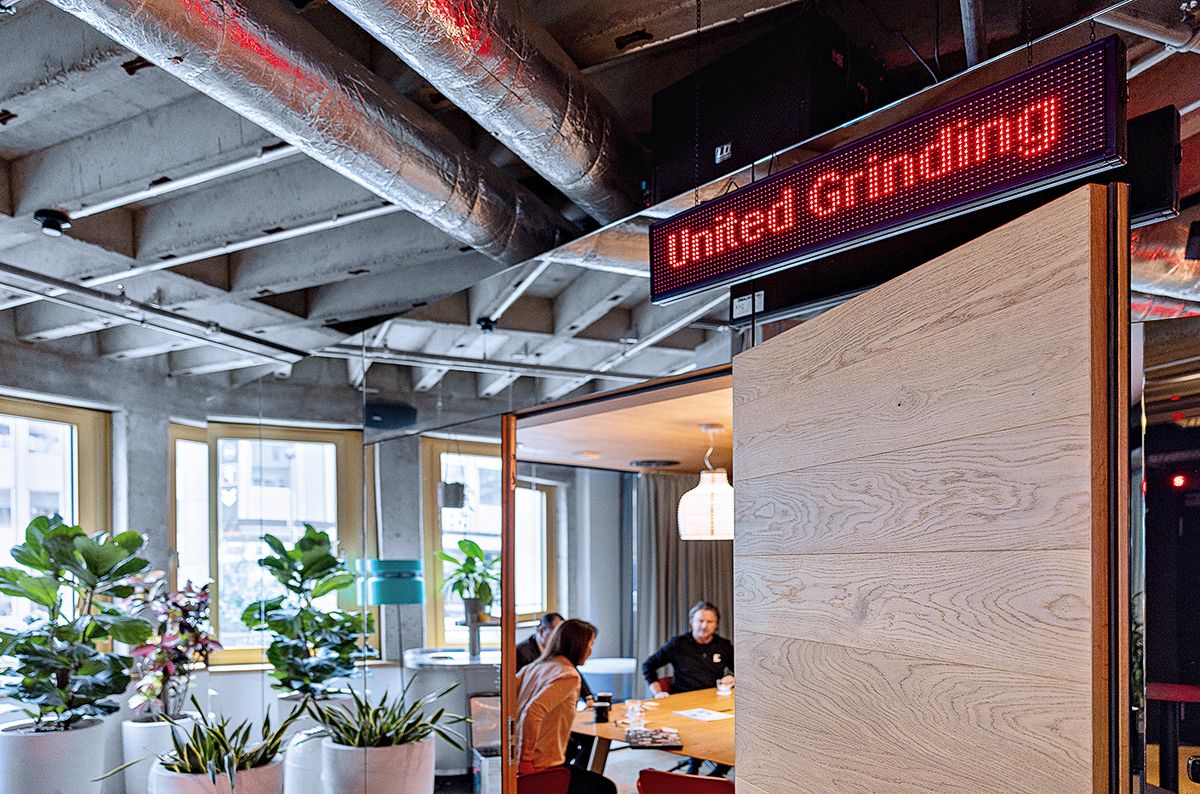
The discussion is about how crucial it is for the future of a company to recruit the right young professionals today. The hotel, which serves as the location, also plays with the theme of the future – in the variant of “retro futurism” in its design.
Has it become more difficult to recruit young professionals for industrial companies? And if so, what changes can be identified here?
HESSE Clearly, yes. It’s also not surprising when you think of issues such as demography, digitalization or changes in values. This certainly does not apply equally in all countries, but it does apply in many. We have digitalization everywhere. We’ve been experiencing a paradigm shift on a broad front since around 2018. I’ve been working on this issue for 25 years. And I’ve never experienced such a high labor shortage in Germany. It turns everything on its head. The backwards way in which companies have dealt with personnel in the last 50, 60 years, is simply no longer tenable. We have a loss of power on the employer side and a significant increase in power among workers.



You’re talking about Germany …
BAUDER-ZILLY Yes, but I would also agree with the description globally. Robert Bosch GmbH faces greater challenges globally when it comes to hiring than in Germany, because the brand is not as well known abroad. In Germany, we have an awareness of over 90 percent. But generally speaking, the market is picking up. Companies need to come up with more and more ideas so that campaign budgets grow. Of course, there are professionals out there. We just have to be attractive enough for them. That applies to all generations.
NELL We’re finding young professionals. It has become more difficult, but we are still finding them. Our training rate in Europe is over ten percent, which is a lot. What you describe applies to us in Germany and Switzerland. In the USA, for example, we offer training based on the dual system of Switzerland or Germany. That makes us an attractive employer for young people in the USA.
HESSE I can imagine that. But you’re also taking the path of offering something interesting that has the interests of the target group in mind.
NELL Yes, certainly. And in China, we’re also finding people without any problem. But the situation is also different in other parts of Europe than in Germany and Switzerland. Let’s look at Italy, at Spain, how high youth unemployment is there. I’m always hearing: Companies need to. However, companies must also be able to do so. Because we can only be fair to everyone if we ourselves are competitive and successful – and in the long term. And the global competition we face does not always allow everything that employees and we ourselves would like.
HESSE I’m not so sure. It’s a question of the market. If the labor market is good, they do not have to do anything at all. But the market is not good. I know what’s going on in the companies. Today, people are sitting together discussing the topic on the Board of Management, earlier it was at the head of division level.
NELL If this is no longer possible here, companies will have to move to countries where it is possible. And where people don’t just ask “What can the company do for me”, but also “What can I do for the company”. We try to meet the needs of our employees as much as possible. But not all wishes can be fulfilled. For example, you cannot complete vocational training part-time. We’ve already been asked this question.
HESSE I’m not saying that we always have to focus entirely on the needs of the employees. Sometimes you first have to create a feeling for work. What does that actually mean? That there’s no wish list for every position. But you have to pay attention to the point of view from which you’re arguing.
BAUDER-ZILLY I have really great people on my team who have just graduated from a university, who want something and have a lot of drive. Of course, they’re also asking for something from me, but they can do that too. I’m also asking for something.



Can’t we already demystify Generation Z? Perhaps it’s more of a German feature article topic. There are also many studies that show that this generation’s needs are not that different. A secure job continues to be the most important desire …
BAUDER-ZILLY It’s been proven in the meantime that the greatest differences depend on stages of life and not generations. I can also see this from my personal experience as a mother of three children. People are driven by the fact that they are at a certain stage of their lives. Perhaps they give a lot because they are coming straight from graduating and the job can take up a lot of room in their lives. And in another phase, when they build a house or they have children, that changes again. It has nothing to do with whether I was born in 1978 or 1998. In a survey, we found that working remotely is even more important for older professionals than for students. Perhaps because they need more flexibility due to their stage of life.
HESSE Anyone who is 16 years old today and grows up with climate change and the war in Ukraine will have a different feeling than someone who was in this phase of life ten years ago. But I wouldn’t overstate it. In the end, people want to know their needs are being taken into account – and the market shows that they have better conditions than ever to impose that. I don’t link that with generations. Today, people who have an office job simply say to themselves: Why should I come to the office every day when I can do it from home? But 50-year-olds say that just as much as 25-year-olds.
NELL Many of the young people who are with us today are no different than in the past. And hasn’t it always been the parents’ generation that is more concerned about the future? And our experience with the topic of working from home is that this option is not used at all by many employees. An enthusiasm for the job, the company, and the team develops on site in the company. A relationship can’t be built through video alone.
HESSE I’m hesitant to agree with you. In the working world of our own company with 550 people, it is my experience that a whole lot is done virtually and digitally because the business model allows it. And of course, personal contact is important. But we are very much thinking about how to create certain moments that are suitable for identification and motivation in order to then digitally depict normal work in most cases.
NELL We have a larger group of people who have to be in the plant because someone has to assemble the machines. That doesn’t work from home. These employees, in turn, need support from upstream and downstream activities or jobs. This reduces the issue of working from home to a few where it’s even possible without affecting the efficiency of the work processes.
HESSE Jobs are simply not all the same. Working from home is often perceived as unfair. But what was it like in the past when you worked in a factory from seven to three, and the salesperson had to leave at seven in the morning and only came home at nine in the evening. That was also not fair.



The recruitment market that has changed in many respects has also led to the further development of recruiting methods. Ms. Bauder-Zilly, what is the approach at Bosch?
BAUDER-ZILLY We’re a big company. Globally speaking, we’re filling many thousands of positions. There are many hundreds of thousands of applications coming in every year. Therefore, the processes must be as efficient as possible. We analyze what data is generated along the entire hiring funnel – from attraction to the time when we make the commitment and issue the contract. That allows us to optimize our processes and identify how and where specific content can best be conveyed: for example, at a local event, an Instagram campaign or a Google search campaign. We can then track exactly which target groups we are addressing with the measure or at which funnel step we may lose them. What is the quality of the applicants and where is the appointment ultimately made?
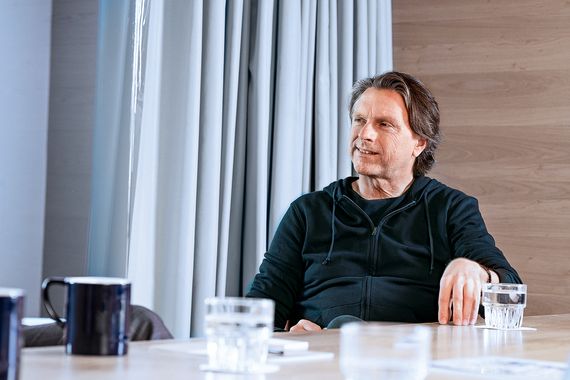
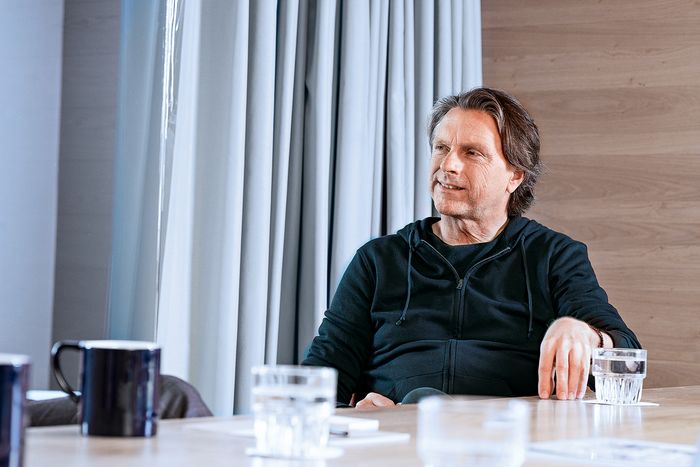
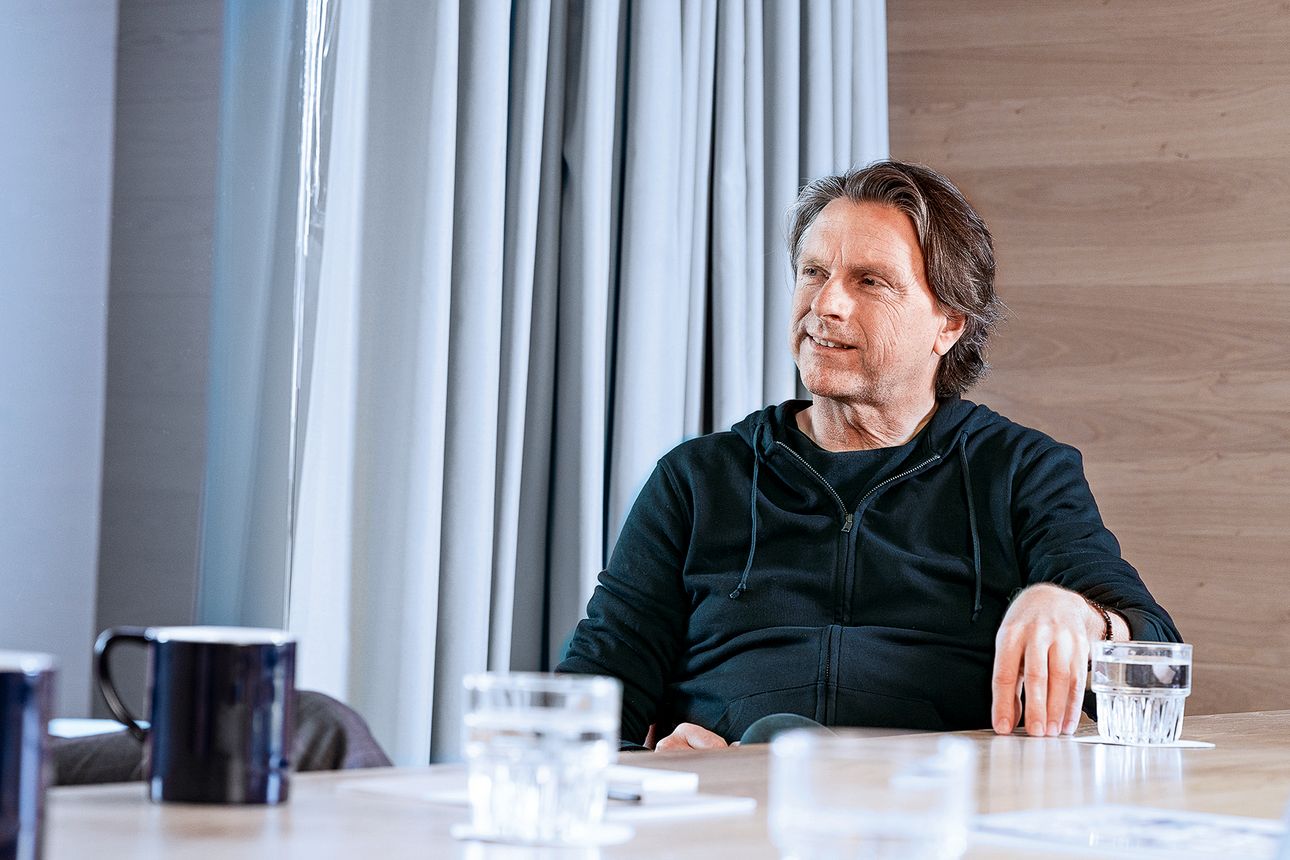
You have automated the application and selection process, so to speak …
BAUDER-ZILLY It’s not about a machine taking over the staffing process. We’re far from that, and I never want to go there. But let’s take the issue of hard-to-fill positions. Why is a position considered difficult to fill? Because this has been someone’s experience. But another recruiter may have had a completely different personal experience. In the case of such questions, we no longer settle for subjective impressions, but instead say: Okay, let’s look at the numbers. How long has the job been online? Is it sufficiently well described? Are there too many internal terms that are not understood outside? Is the list of requirements much too long, and do people feel overwhelmed? Is the text too complex? Is the ad gender-specific? We have a tool to help us identify that. We’ve seen that more men apply for jobs that have more complex descriptions. If we want to hire more women, we need to pay attention to the wording. And then we see how the ad performs after the optimization. With such approaches, we can double conversion rates.



How long can such a recruiting process last?
NELL We have to link people to us in advance. For example, we may have met someone at an event, or perhaps the person has also applied to us. If we were not able to offer suitable candidates a job at the moment, we would still make contact. By this I don’t mean sending newsletters, but calling them personally. What is their situation? What stage of life are they in? Maybe their partner also needs a job in the region to make it work? And when we have all the specific information, we can fill the position identified as “hard to fill”.
HESSE Recruiting analytics are definitely the way to go now. Around half of the companies with more than 1,000 employees are already using it. However, this requires the appropriate staff department or external support.
BAUDER-ZILLY We’ve already had phases when we hired many external employees. At the moment, we’re more in the consolidation phase and are focusing on real hard-to-fill positions. These include, for example, experts in the areas of cyber security, semiconductors or artificial intelligence. These are specialists that we still need to bring in from outside. Otherwise, we also have a huge internal labor market with 130,000 employees in Germany who also want to develop further.
The profiles we’re looking for are very, very difficult to find. This is a tough business, and we’re pulling out all the stops. We also do suitability diagnostics – a topic we have just implemented in our bundled expert service, the People Acquisition Campus. Ultimately, we want to increasingly move away from gut feelings and make truly informed decisions.
NELL We’re struggling in Germany to find service technicians. Traveling, being on the go, not being at home anymore: Most people don’t want that. We’ve therefore decided to take the matter into our own hands and to train or develop our existing employees locally on site – in our own service academies.
HESSE Could this job be partially digitalized, for example, with remote maintenance?
NELL To some extent, yes. Digital solutions such as remote service are on the way, and we’re also continuously developing new digital assistance systems. Our C.O.R.E. panels can even be used for video conferencing directly on the machine. And the system is intelligent enough to provide the most important data directly for quick debugging, if the customer allows it. This way, our customers and our Customer Care team can definitely save a few trips.
But at the end of the day, it’s mechanical engineering with tons of machines that contain a lot of high-tech and where not all work can be done remotely.
HESSE That’s a problem in many industries, including the care sector. There are so many examples where working from home doesn’t work. What can employers do? They can work on their corporate culture and address their target group precisely. To do this, they need to know the exact needs of their target groups and make suitable offers accordingly. In the coming years, the labor market situation will increasingly force companies to adapt in one way or another.
NELL What we’re trying to do is train our young professionals ourselves. If I look at the machine tool manufacturers, mostly medium-sized companies who are struggling to find people, then they probably don’t train enough. It’s going well for us. And among those who do the training, there may also be service technicians.
BAUDY-ZILLY I think it’s really good to tackle such issues in the long term and not just shut the stable door after the horse has bolted. If you start with training, you really have the people you need.
HESSE Many technologies and mechanisms that have actually been common in marketing for years have now arrived in recruiting. Instead of the gut feeling of experienced recruiters who roughly knew who fit where, campaign-oriented work is now being carried out with figures, data and specific target group approaches. Someone who works in IT wants to experience completely different things than someone in logistics, who may be primarily concerned with salary. Cents in hourly wages often make the difference. The old idea that we have a career website where candidates can find what suits them is increasingly a thing of the past. And that is not a German phenomenon. That’s international. Because we are experiencing digitalization everywhere, how we shop, how we watch TV, how we listen to music. Individualization is increasing everywhere, and this does not stop with the HR issue.
BAUDER-ZILLY To a certain degree, it doesn’t matter to me whether I’m selling a job or strawberry yogurt. Of course, it makes a difference whether someone buys yogurt in the supermarket or makes a life-changing decision for a new job. But the marketing mechanisms behind them are no different. That’s also something that I first had to understand and that has now slowly arrived in the HR departments.
HESSE For me, recruiting today is a triad of technology, data-driven work – and ultimately the question: Why should I work for this employer? And that has to be answered individually for each person.
NELL One challenge in machine tools is our image. Many people don’t even know what we do and what our plants look like. They still have the outdated idea in mind that the production hall smells of oil, and hands are dirty. In reality, you can eat off the floor. The work is no longer just about assembling something with your hands. It’s about high tech at the highest level. Otherwise, we couldn’t possibly produce machines with this level of high precision. And of course, that also includes sophisticated software. That’s why we’re now employing more and more software engineers. And people are often not even aware of what machine tools can do. As a medium-sized company, we operate in a wide range of industries. From automotive, aircraft or shipbuilding to the energy industry, packaging, medicine and many other things – including those that are not yet available and are only just entering the market. Someone has to produce it all. First and foremost, we’re trying to show what we do. The effort to find the next generation of talent is taking place at a very local level. If we’re looking for young professionals in Tübingen, we have to be active in Tübingen, just like in Thun. People are not mobile, they want to stay in their region. And we’re looking for people in more than 20 locations. Sometimes we also try to transfer professionals between locations. But that’s difficult. There are few who are willing to do so. Extremely long periods of employment at a company are very positive. We have people who have been with the company for over 50 years and employees who are already working for us in the second generation. And we have low staff turnover rates. And our goals? We want people to go the extra mile. Because I can copy everything in the company, except for two things. One is the image, the good reputation of the brand, which you have to develop. The second thing you can’t copy is a motivated team that does a little more than the others.
BAYDER-ZILLY Actually, all companies want employees who go the extra mile. I think the question is, how do I get there? And there are probably different answers. And my personal answer would be that as a large corporation, like the one I work for, I can also respond individually to the needs of people in their respective phases of life.
HESSE And Mr. Nell, how do you ensure that this extra mile will be walked?
NELL We have a lot to offer as an employer. We’re an internationally active and technologically leading company. That offers a wide range of professional opportunities. We attach great importance to promoting our employees – whether through experience abroad, training and further education or assuming more responsibility, i.e., making a career – regardless of certifications or certificates of employment. We give people who want it and can do it a real chance. And that’s why we’re also looking primarily for people and not just their training.
HESSE So their attitude?
NELL Well, the person has to fit. Of course, they should have as a prerequisite that they can do the job afterward. But I can learn technical things. If the person fits into the team, then the rest will come. If they’re fantastic professionally, but don’t fit as a person, then it won’t work.
HESSE I wouldn’t say that the gut doesn’t matter either. But I would say that a gut decision shouldn’t be at the forefront, but rather the methodology should be at the forefront, supplemented by the gut. Reaching out to target groups of the right age regionally with a specific story is possible today, but wasn’t five years ago.
NELL For example, we let our learners tell their own story, which is the most authentic. They set up the stand themselves at local trade shows and make videos and entire social media campaigns. We don’t prescribe what they should say. And when professionals are with us for the first time, we try to keep them. Most of them are passionate about their work. Not 100 percent, we can’t manage that. But a large proportion of our employees are enthusiastic about the company they work for.








